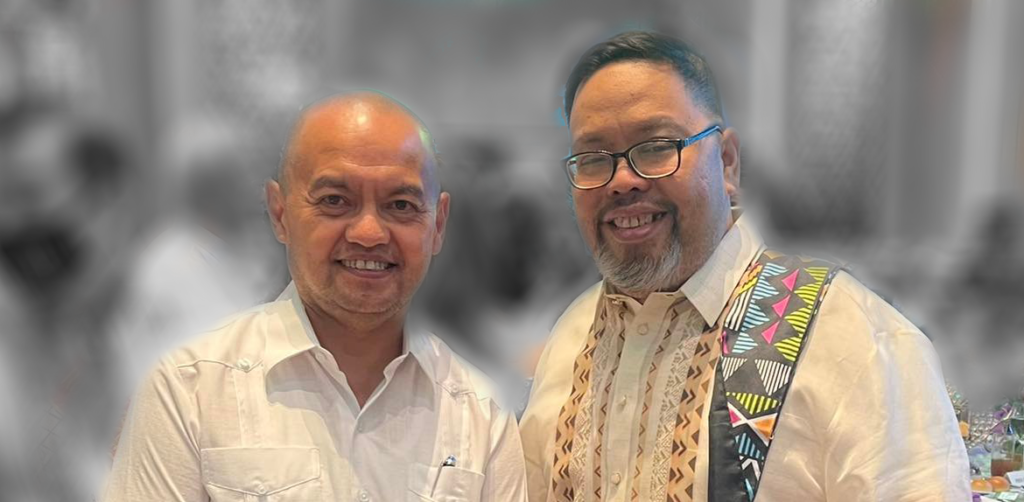July 1 marks the start of the Rotary Year, and it kicks off with the induction of the incoming Governor and their cadre of District Officers, with the outgoing Governor handing over the reins of governorship. This year, the Induction and Handover of Rotary International District 3810 were held in person for the first time since 2019, which made the event doubly significant.
This Induction and Handover was especially momentous for me as well since I was going to be part of the ceremonies as an inductee into the incoming Governor’s Executive Committee – a position I had not even considered possible for me when I first joined Rotary in 2018. On top of that – and basically as part of my functions as District Spokesperson – I had the honor and privilege of introducing our guest speaker: the Honorable Senior Associate Justice Marvic Leonen.

I would have preferred to use the introduction I wrote for him, but for protocular (hah! what a word) reasons, I had to scrap the one I wrote stick to the one provided by his office. It went like this:
Our speaker is a boomer and proud of it. Born in the 60s and one of the youngest justices to be appointed, he is still one of the younger ones. This makes him not only a bridge to the future, but also a link to the past – an idiosyncrasy reflected whenever he is called upon to wield his pen.
Our speaker is undoubtedly a man of excellence and scholarship. After graduating magna cum laude from the UP Diliman School of Economics, he went on to finish fourth in is class at the UP College of Law. He then pursued his Master’s Degree in Law from Columbia University in New York.
As a member of the faculty of the UP College of Law, the Director of its Office of Legal Aid, and later on its Dean, he built on the rich traditions of the College while introducing changes that allowed both faculty and students to engage more in critical discussions attuned to current realities – allowing for intellectual discourse to flourish inside classrooms and beyond.
A man of service, our speaker’s involvement in socio-civic causes started even before he passed the Bar. He was President of the Law Student Government in the UP College of Law and was active in progressive movements and assisting human rights organizations during Martial Law. This dedicated son on of Baguio also co-founded the Legal Rights and Natural Resources Center Inc., Kasama sa Kalikasan, which advocated the rights of long-term upland communities composed of mostly farmers and indigenous peoples.
Since then, he has worked with indigenous communities, farmers, agrarian reform beneficiaries, political detainees, the urban poor, and families of the involuntarily disappeared, his work bringing him to some of the farthest places in our archipelago.
Our speaker is also a man who strives for peace. During the Aquino Administration, he was appointed as Chief Peace negotiator where he became instrumental in negotiating a framework agreement for peace with the largest insurgency group in the country, the Moro Islamic Liberation Front.
His greatest role, however, is that of man of justice. Some say that one’s identity as a magistrate constantly evolves, but from the beginning, our Speaker has charted his own course with fidelity to truth and applying justice as he best understood it.
You can never doubt that his opinions, commonly dissents, are always thoroughly researched and meticulously organized. Apart from the scholarship, which is never there for its own sake, shining gems of his literary sophistication can also be found every now and then in his writings. Who else would quote Herbert Marcuse to talk about the effect of institutionalized inequalities on civil liberties, or borrow a quote from General Luna?
When asked if he ever sensed futility in his protests, he argues that “today’s dissent is tomorrow’s majority.” Our speaker believes that the importance and the urgency of a topic depends on how it contributes to the constitutional discourse. His acute appreciation of the role he has as a magistrate and his responsibility to history is now only shown in his dissents but, more importantly, in the decisions he writes which contribute to the evolution of jurisprudence in our country.
During his speech at the oath taking of new lawyers from what was quotes as the “BestBarEver,” he shared his philosophy: “Protect those who have less in life; Do not stand for abuse; Be accepting of different identities; Speak up against corruption; Do not succumb to having more than enough; Do not trade kindness for the false badge of success. When you enter public office, discharge it for the public trust that it is.”
With this, it is with great honor that I introduce our Speaker today, 2021-2022 Bar Chairperson, Man of the People, Man of Many Things, Supreme Court Senior Associate Justice Marvic Mario Victor F. Leonen.
A good introduction is one that gives the audience an idea of the calibre of the speaker, based on a top-level summary of his accomplishments and credentials. It could be a comprehensive summary, or it could dwell on only one or two things – the bottom line is that it should encapsulate what makes the speaker stand out. A great introduction, on the other hand, is one that does all of the above, but also gives the audience a clear idea of WHY the speaker was chosen. This introduction of Justice Leonen, I think, falls into the latter category.

The introduction very clearly demonstrates, without straying into hard-sell territory, how the man – his achievements, his beliefs, his advocacies – so very closely mirror the imperatives of Rotary: a dedication to service, a commitment to truth and justice, and the promotion of diversity, equity, and inclusiveness.

